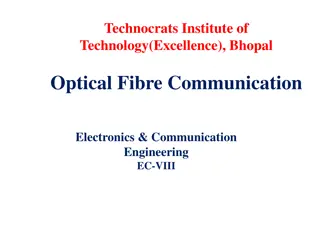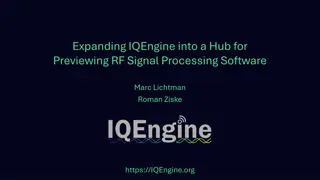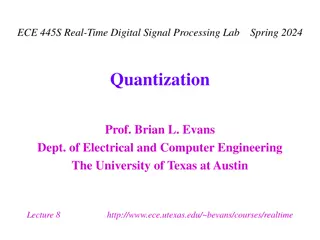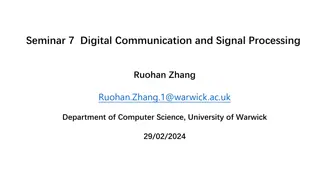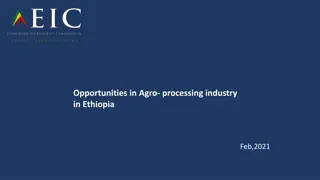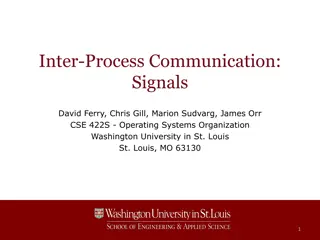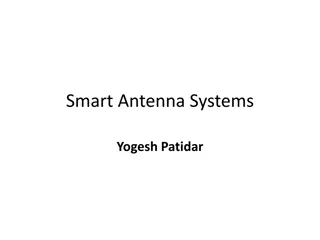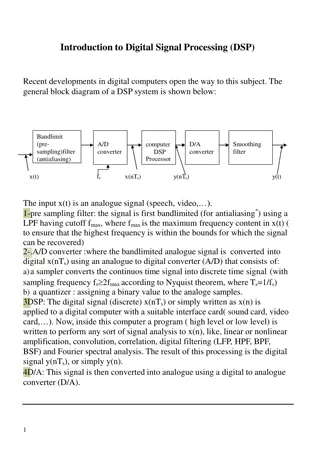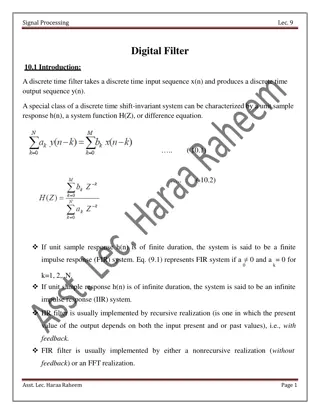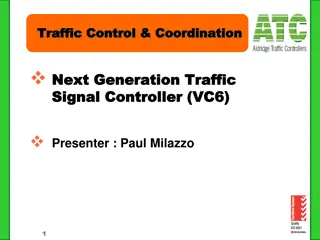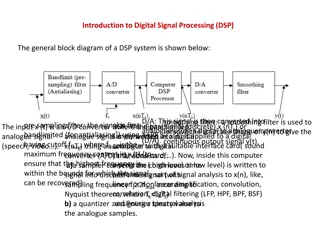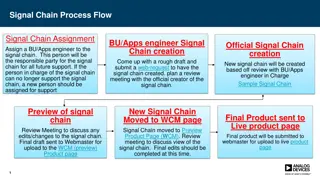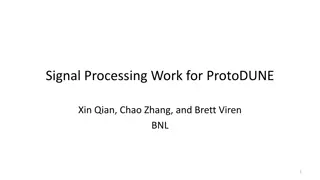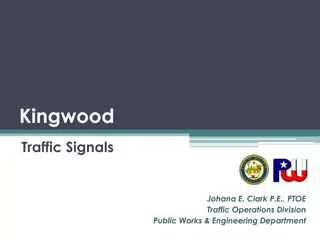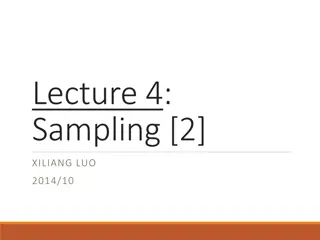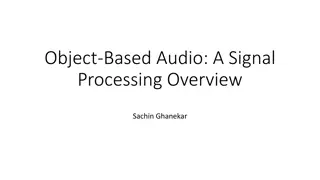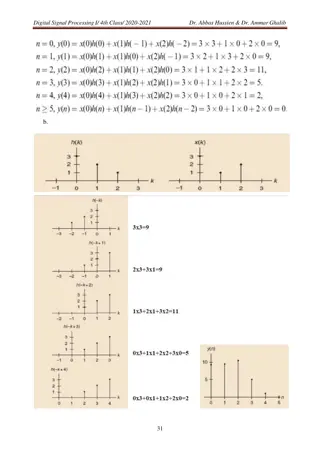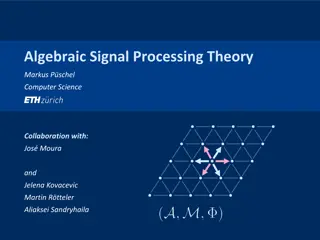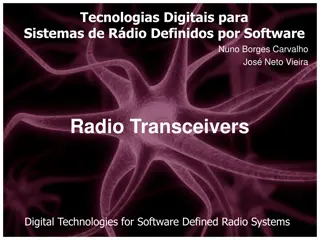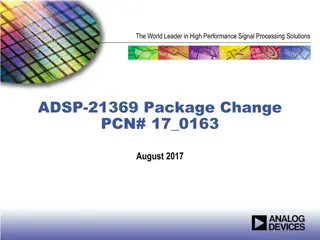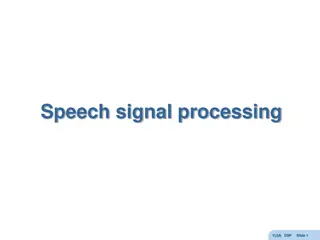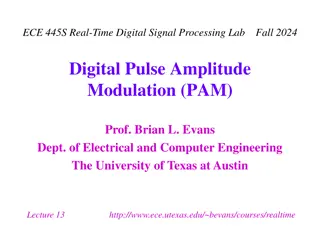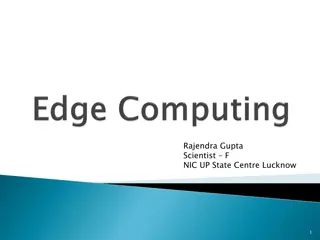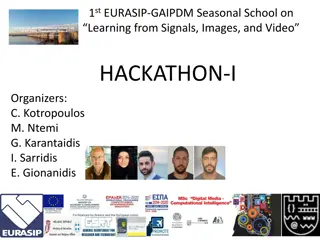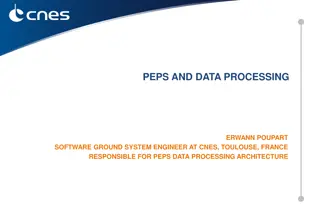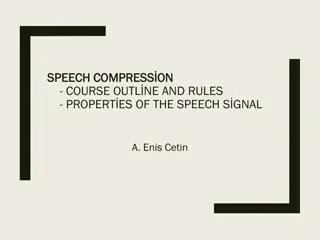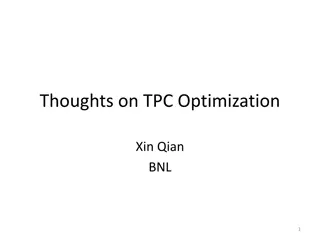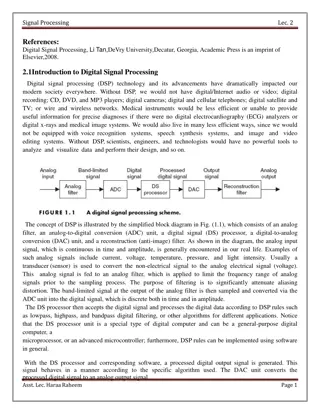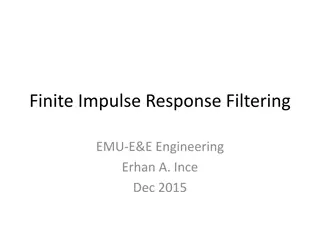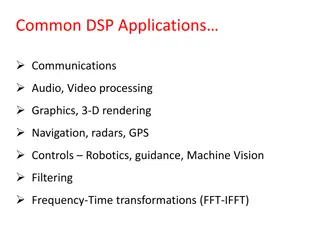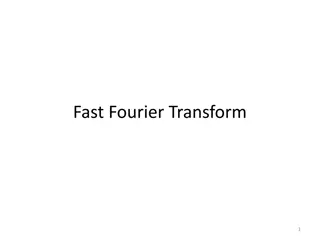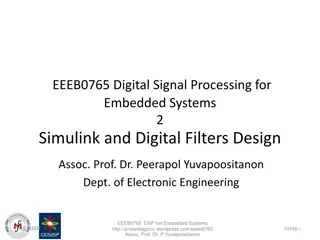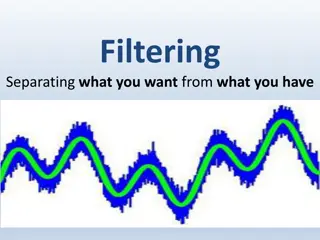Understanding Interpolation and Pulse Shaping in Real-Time Digital Signal Processing
Discrete-to-continuous conversion, interpolation, pulse shaping techniques, and data conversion in real-time digital signal processing are discussed in this content. Topics include types of pulse shapes, sampling, continuous signal approximation, interpolation methods, and data conversion processes
4 views • 14 slides
Understanding Optical Fiber Signal Degradation in Communication Engineering
Technocrats Institute of Technology (Excellence) in Bhopal delves into the concepts of signal degradation in optical fiber communication, focusing on attenuation, distortion mechanisms, and measurement techniques. The institute emphasizes the importance of signal attenuation and its impact on inform
4 views • 56 slides
Expanding IQEngine: A Hub for Previewing RF Signal Processing Software
IQEngine is evolving into a versatile hub where users can manage, analyze, process, and share RF signal recordings directly in their browser. Built on an open standard, IQEngine stores data such as sample rate, center frequency, and IQ data type to prevent data degradation. Frontend powered by React
7 views • 22 slides
Real-Time Digital Signal Processing Lab: Quantization and Resolution Overview
Explore quantization and resolution techniques in real-time digital signal processing. Topics include quantization error analysis, total harmonic distortion, noise immunity in communication systems, human sensory resolution, analog-to-digital conversion, and uniform amplitude quantization. Dive into
7 views • 19 slides
Seminar 7 Digital Communication and Signal Processing
Learn how to design a second order ARMA filter to suppress sinusoidal disturbances in a signal while preserving the original signal. The process involves deriving the transfer function, determining coefficients, and sketching a block diagram representation of the filter.
0 views • 7 slides
Opportunities in Ethiopia's Agro-Processing Industry
Ethiopia stands out as a leader in raw material production for agro-processing industries, offering opportunities in dairy, juice processing, edible oil processing, poultry, beef production, and tomato processing. With abundant resources, suitable climate conditions, and a growing domestic market, E
0 views • 8 slides
Understanding Inter-Process Communication Signals in Operating Systems
Signals in inter-process communication are asynchronous notifications delivered to specific processes, allowing event-based programming. Processes can handle signal delivery by ignoring it, terminating, or invoking a signal handler. Signal handlers can be written in two ways - one handler for many s
0 views • 21 slides
Smart Antenna Systems Overview: Enhancing Wireless Performance
Smart antenna systems, like adaptive array antennas and switched beam antennas, combine antenna arrays with digital signal processing to transmit and receive signals adaptively. These systems improve signal quality, reduce interference, and increase capacity by dynamically adjusting radiation patter
0 views • 20 slides
Parallel Implementation of Multivariate Empirical Mode Decomposition on GPU
Empirical Mode Decomposition (EMD) is a signal processing technique used for separating different oscillation modes in a time series signal. This paper explores the parallel implementation of Multivariate Empirical Mode Decomposition (MEMD) on GPU, discussing numerical steps, implementation details,
1 views • 15 slides
Overview of Digital Signal Processing (DSP) Systems and Implementations
Recent advancements in digital computers have paved the way for Digital Signal Processing (DSP). The DSP system involves bandlimiting, A/D conversion, DSP processing, D/A conversion, and smoothing filtering. This system enables the conversion of analog signals to digital, processing using digital co
1 views • 24 slides
Introduction to Digital Filter Design in Signal Processing
Discrete time filters play a crucial role in signal processing, with finite impulse response (FIR) and infinite impulse response (IIR) systems being two key types. FIR filters have finite duration unit sample responses, while IIR filters have infinite duration responses. FIR filters are implemented
1 views • 12 slides
Traffic Control and Coordination: Next Generation Signal Controller Overview
Explore the evolution of traffic signal controllers in Australia, from VC5 to VC6, along with the software integration and system overview. Learn about the hardware configurations and capabilities of the latest TSC/4 controllers, including signal group monitoring and conflict capabilities. The new g
4 views • 10 slides
Understanding Digital Signal Processing (DSP) Systems: Linearity, Causality, and Stability
Digital Signal Processing (DSP) involves converting signals between digital and analog forms for processing. The general block diagram of a DSP system includes components like D/A converters, smoothing filters, analog-to-digital converters, and quantizers. DSP systems can be classified based on line
1 views • 12 slides
Mastering the Art of Introducing Quotes with Signal Phrases
Understanding the importance of signal phrases in academic writing. Signal phrases provide context, establish credibility of sources, and prevent dropped quotes. Learn the key elements required for an effective signal phrase and how to structure them using different formulas. Enhance your writing by
1 views • 16 slides
Developing and Managing Signal Chains for Future Support
Create a system to assign a responsible person for signal chains, initiate the chain creation process, review and finalize the signal chain, and move it to the live product page. Guidelines include color codes for blocks, assigning part numbers to each block, and adding images to the signal chain.
1 views • 4 slides
Advancements in Signal Processing for ProtoDUNE Experiment
The team, including Xin Qian, Chao Zhang, and Brett Viren from BNL, leverages past experience in MicroBooNE to outline a comprehensive work plan for signal processing in ProtoDUNE. Their focus includes managing excess noise, addressing non-functional channels, and evolving signal processing techniqu
1 views • 23 slides
Comprehensive Training Package on Active Tuberculosis Drug Safety Monitoring and Management (aDSM) 2023
This training package focuses on signal detection in active tuberculosis drug safety monitoring. It covers the main aims and principles of signal detection, completion of safety profiles for new TB drugs and regimens, definition of signal, continuous reporting activities, construction of risk profil
5 views • 15 slides
Kingwood Traffic Signals Overview and Updates
Traffic operations in Kingwood, managed by Johana E. Clark, P.E., include signal system improvements and updates. Recent changes involve signal removal studies, new signal installations, and upgrades at key intersections to enhance traffic flow and safety. The system's capacity and daily traffic vol
1 views • 11 slides
Understanding Sampling and Signal Processing Fundamentals
Sampling plays a crucial role in converting continuous-time signals into discrete-time signals for processing. This lecture covers periodic sampling, ideal sampling, Fourier transforms, Nyquist-Shannon sampling, and the processing of band-limited signals. It delves into the relationship between peri
1 views • 60 slides
Understanding Object-Based Audio Processing
Explore the evolution and key concepts of object-based audio processing, including signal processing on headphones and immersive speaker layouts. Dive into the history of digital audio, audio signal parameters, and the progression of audio technologies from PCM to immersive multi-channel formats for
0 views • 34 slides
Digital Signal Processing I 4th Class 2020-2021 by Dr. Abbas Hussien & Dr. Ammar Ghalib
This content delves into Digital Signal Processing concepts taught in the 4th class of 2020-2021 by Dr. Abbas Hussien and Dr. Ammar Ghalib. It covers topics like Table Lookup Method, Linear Convolution, Circular Convolution, practical examples, and Deconvolution techniques such as Polynomial Approac
0 views • 4 slides
Carnegie Mellon Algebraic Signal Processing Theory Overview
Carnegie Mellon University is at the forefront of Algebraic Signal Processing Theory, focusing on linear signal processing in the discrete domain. Their research covers concepts such as z-transform, C-transform, Fourier transform, and various signal models and filters. The key concept lies in the al
2 views • 40 slides
Evolution of Software Defined Radio Systems
Software Defined Radio (SDR) revolutionizes radio communication by implementing traditional hardware components using software on a personal computer. With SDR, modulation techniques, security functions, and waveform requirements can be controlled through software, enabling flexibility and adaptabil
0 views • 20 slides
ADSP-21369 Package Change: Significant Differences in Signal Processing Solutions
Explore the package change details for ADSP-21369, a high-performance signal processing solution leader. Compare the current SBGA package with the new Flip-Chip BGA design, noting the significant difference in package thickness. Gain insights into the transition and implications of this change in Au
0 views • 4 slides
Centre of Excellence in Signal Processing Activities and Progress Report
Broad areas of signal processing activities at the Centre of Excellence in Signal Processing include audio, speech, language, medical image processing, computer vision, wireless communications, and machine learning. The center focuses on addressing various challenges in audio/speech recognition, emo
0 views • 17 slides
Understanding Speech Signal Processing and Phonemes
Delve into the world of speech signal processing, exploring applications like speech storage, recognition, and synthesis. Discover how different languages utilize phonemes to convey meaning through various acoustic units. Uncover the intricacies of speech sampling and phoneme types, from vowels to c
0 views • 73 slides
Real-Time Digital Signal Processing Lab: Digital Pulse Amplitude Modulation (PAM)
Introduction to Digital Pulse Amplitude Modulation (PAM) in the context of Real-Time Digital Signal Processing Lab. Topics covered include pulse shaping, symbol mapping, baseband PAM transmission, and more. The content delves into bit-to-symbol conversion, symbol amplitude mapping, symbol period det
0 views • 18 slides
Understanding Edge Computing for Optimizing Internet Devices
Edge computing brings computing closer to the data source, minimizing communication distances between client and server for reduced latency and bandwidth usage. Distributed in device nodes, edge computing optimizes processing in smart devices instead of centralized cloud environments, enhancing data
0 views • 32 slides
Innovative Research Projects in Signal Processing, Tourism, and Language Translation
This text introduces several cutting-edge research projects in different domains, including signal processing, tourism recommendation systems, price prediction, hotel rating anticipation, and natural language processing for translations. Each project aims to solve unique challenges using advanced te
0 views • 5 slides
Insight into PEPS Data Processing Architecture by Erwann Poupard
Erwann Poupard, a Software Ground System Engineer at CNES, Toulouse, France, plays a crucial role in the PEPS data processing architecture. The outline covers PEPS HPSS data storage statistics, current data processing trends, and future plans including PEPS V2 development. Explore PEPS processing ch
0 views • 8 slides
Speech Signal Processing Course Outline and Grading System
This course outline covers various topics related to speech signal processing, including properties of speech signals, quantization, coding techniques, and standards in cellular telephony. The grading system includes midterm exams, homework assignments, a term project, and a final exam. Key referenc
0 views • 23 slides
Understanding Inter-Process Communication Signals in Operating Systems
Signals in operating systems play a critical role in facilitating asynchronous notifications between processes. They allow for event-based programming and are conceptually similar to hardware interrupts and exceptions. Processes can handle signal delivery by ignoring it, terminating, or invoking a s
0 views • 24 slides
Insights on TPC Optimization for Particle Detection
Explore the optimization of Time Projection Chambers (TPC) for particle detection through discussions on basic reconstruction, charge resolution, detector parameters, wire pitch, signal processing, deconvolution techniques, and noise analysis. Gain valuable insights on field and electronics response
0 views • 28 slides
Understanding Digital Signal Processing in Modern Society
Digital Signal Processing (DSP) technology has revolutionized modern society by enabling advancements in areas such as audio, video, communication, medical diagnostics, image processing, and data analysis. This technology involves converting analog signals to digital, applying digital algorithms for
0 views • 4 slides
Understanding Finite Impulse Response Filtering in Digital Signal Processing
Explore the concepts of Finite Impulse Response (FIR) filtering in digital signal processing, including filter specifications for low-pass, high-pass, band-pass, and band-stop filters. Learn about frequency normalization, specifications for different filter types, and the transfer function of FIR fi
0 views • 26 slides
Performance of Scintillation Pixel Detectors with MPPC Read-Out and Digital Signal Processing
Mihael Makek presents the performance evaluation of scintillation pixel detectors with MPPC read-out and digital signal processing at the 2nd Jagiellonian Symposium on Fundamental and Applied Subatomic Physics in Krakow, 2017. The study includes the construction and testing of segmented detector arr
0 views • 25 slides
Understanding Digital Signal Processing (DSP) Applications and Architectures
Explore the wide-ranging applications and essential tasks of Digital Signal Processing (DSP) in various fields such as communications, audio and video processing, graphics, navigation, robotics, and more. Delve into the specialized features and requirements of DSPs, including efficient numerical cal
0 views • 42 slides
Understanding Fast Fourier Transform (FFT) in Signal Processing
Fast Fourier Transform (FFT) is a powerful algorithm used in signal processing to efficiently calculate the Discrete Fourier Transform (DFT). This advanced technique leverages symmetry and periodicity properties to reduce computational complexity, making it a key tool in digital signal analysis. By
0 views • 14 slides
Digital Signal Processing for Embedded Systems: Simulink and Digital Filters Design
Explore the world of Digital Signal Processing for Embedded Systems with an emphasis on Simulink and Digital Filters design. Discover tools, examples of Simulink models, basics of noise cancellation, and applications of active noise cancellation headphones. Dive into the realm of Embedded Systems th
0 views • 38 slides
Exploring the Power of Filtering in Signal Processing
Delve into the world of signal processing and filtering as a means of separating desired information from noise. Explore the role of digital filters in processing images and signals. Discover how filtering can achieve noise cancellation in headphones, clean up noisy images, and understand the import
0 views • 29 slides

